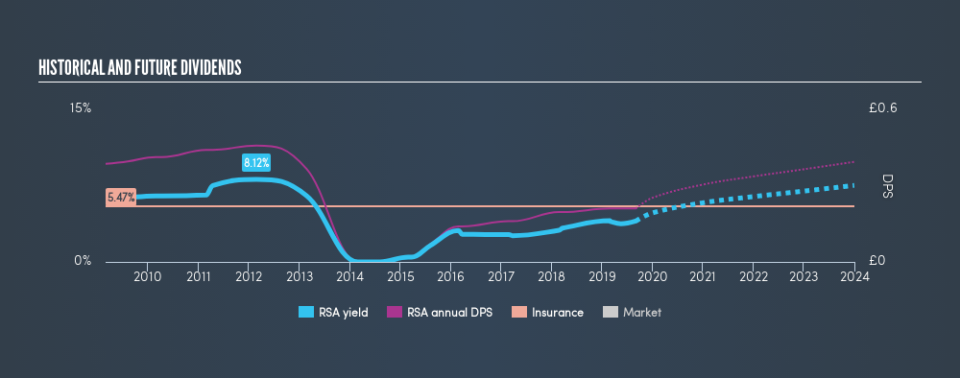RSA Insurance Group plc (LON:RSA)'s Could Be A Buy For Its Upcoming Dividend

RSA Insurance Group plc (LON:RSA) is about to trade ex-dividend in the next 3 days. If you purchase the stock on or after the 5th of September, you won't be eligible to receive this dividend, when it is paid on the 11th of October.
RSA Insurance Group's next dividend payment will be UK£0.075 per share, on the back of last year when the company paid a total of UK£0.21 to shareholders. Last year's total dividend payments show that RSA Insurance Group has a trailing yield of 4.0% on the current share price of £5.234. Dividends are an important source of income to many shareholders, but the health of the business is crucial to maintaining those dividends. That's why we should always check whether the dividend payments appear sustainable, and if the company is growing.
View our latest analysis for RSA Insurance Group
If a company pays out more in dividends than it earned, then the dividend might become unsustainable - hardly an ideal situation. Its dividend payout ratio is 84% of profit, which means the company is paying out a majority of its earnings. The relatively limited profit reinvestment could slow the rate of future earnings growth We'd be concerned if earnings began to decline.
Generally speaking, the lower a company's payout ratios, the more resilient its dividend usually is.
Click here to see the company's payout ratio, plus analyst estimates of its future dividends.
Have Earnings And Dividends Been Growing?
Businesses with strong growth prospects usually make the best dividend payers, because it's easier to grow dividends when earnings per share are improving. If business enters a downturn and the dividend is cut, the company could see its value fall precipitously. It's encouraging to see RSA Insurance Group has grown its earnings rapidly, up 67% a year for the past five years.
Another key way to measure a company's dividend prospects is by measuring its historical rate of dividend growth. RSA Insurance Group has seen its dividend decline 5.9% per annum on average over the past 10 years, which is not great to see. It's unusual to see earnings per share increasing at the same time as dividends per share have been in decline. We'd hope it's because the company is reinvesting heavily in its business, but it could also suggest business is lumpy.
To Sum It Up
From a dividend perspective, should investors buy or avoid RSA Insurance Group? RSA Insurance Group has an acceptable payout ratio and its earnings per share have been improving at a decent rate. Overall, RSA Insurance Group looks like a promising dividend stock in this analysis, and we think it would be worth investigating further.
Ever wonder what the future holds for RSA Insurance Group? See what the ten analysts we track are forecasting, with this visualisation of its historical and future estimated earnings and cash flow
A common investment mistake is buying the first interesting stock you see. Here you can find a list of promising dividend stocks with a greater than 2% yield and an upcoming dividend.
We aim to bring you long-term focused research analysis driven by fundamental data. Note that our analysis may not factor in the latest price-sensitive company announcements or qualitative material.
If you spot an error that warrants correction, please contact the editor at editorial-team@simplywallst.com. This article by Simply Wall St is general in nature. It does not constitute a recommendation to buy or sell any stock, and does not take account of your objectives, or your financial situation. Simply Wall St has no position in the stocks mentioned. Thank you for reading.

 Yahoo Finance
Yahoo Finance 
